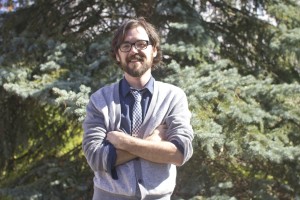Prof recognized


Gordon McNickle, a post-doctoral researcher at Wilfrid Laurier University, was named a Banting Post-doctoral Fellow this past week on Sept. 23.
The Banting Post-doctoral Fellowship program allows researchers to pursue their research in any direction and to realize their potential. This program rewards recipients with $70,000 per year for two years.
According to Julie Conrad, manager of the Vanier-Banting Secretariat, there were a total of 442 eligible applicants but only 70 received awards.
“It’s not a very easy award to get. He [McNickle] went through the review process and submitted all the right documentation. He demonstrated that he merited that award,” said Conrad.
“I guess it feels good to be recognized,” said McNickle.
After all required documentation has been submitted, the selection process begins with a review done by the Natural Sciences and Engineering Research Council (NSERC) and gives an initial score. The score is based on three equally weighted areas: research excellence and leadership in the research domain, quality of the application for proposed research programs, and institutional commitment and demonstrated synergy between applicant and institutional strategic priorities.
Scores are submitted to the Canadian Institutes of Health Research (CIHR), and are equalized in a top-down manner. Lists are finally sent to the Vanier-Banting Steering Committee for final approval.
McNickle’s work focuses on the evolutionary game theory of plants. Game theory is the strategy that plants use to communicate with each other and with other organisms. Studying evolutionary game theory helps him in understanding how these strategies explain the coexistence of plants and other organisms. The University and the Cold Regions Research Centre (CRRC) are interested in applying this research to changes in the boreal forest.
McNickle believes that he was chosen as a fellow due to the fit between him and the institution.
“That fit that’s happening between me and the great stuff that’s already happening at Laurier. Probably a big part [as to why I was chosen],” he explained.
“What it means for the recipients, is they are well-positioned for the leaders of tomorrow in any type of research they undertake,” said Conrad.
According to McNickle, the university’s partnership with the government of the Northwest Territories and the research currently happening is what convinced him to pursue his work at WLU. Also, working with Jennifer Baltzer, a biology professor at Laurier, has helped him to further develop his mathematical ideas and how they can be applied to real world systems.
Going forward, McNickle said, “It’s a good feather in my cap. It’s a rare thing to have the freedom to pursue research in every direction I want and with the support of people like Jen and the CRRC, gives me a lot of access to resources. So I guess I hope that I’ll come out of here knowing a lot more. I would not be here if not for her.”
In terms of pursuing his own research in evolutionary game theory, McNickle is convinced that evolutionary games are important in the study of the environment and biology.
“So I guess I’d like to think I’m onto something that’s the right answer — time will tell.”


